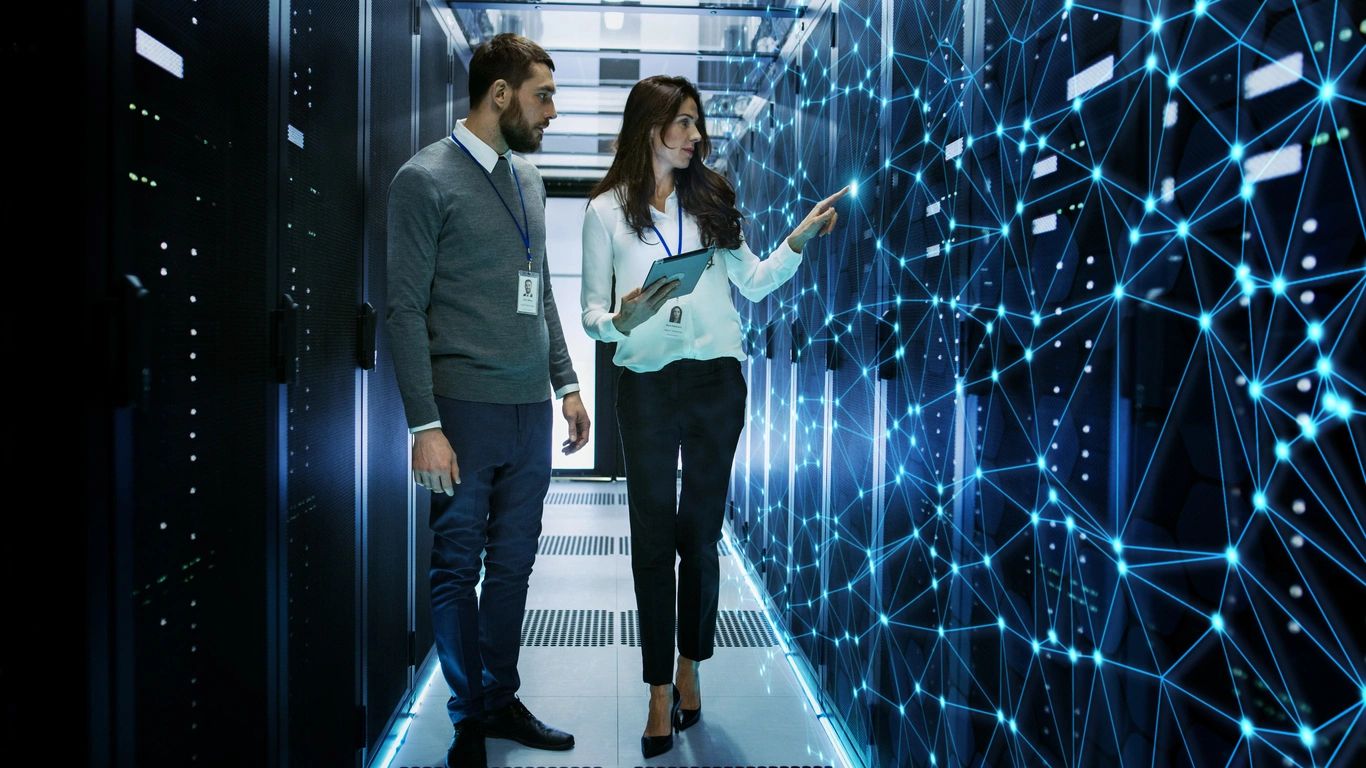The rapid evolution of artificial intelligence (AI) is no longer a futuristic fantasy. It’s actively reshaping the job market right in front of us. This whirlwind of advancements brings a mix of excitement and apprehension as we try to predict what’s next for workers across various industries. Let’s dive into this complex topic of AI’s impact on jobs, dissecting the potential challenges and opportunities it presents. We’ll explore how this technology will transform the way we work, highlighting the skills needed to thrive in an AI-driven future.
The fear that robots are coming for our jobs is not a new one. However, the reality is far more nuanced. It’s not as simple as AI systems swooping in and completely replacing human workers.
Some experts believe the changes brought by AI will be gradual and take place over a more extended period than often portrayed in the media. This means we have time to adapt and even benefit from the changes brought by these advancements.
Table of Contents:
- Impact of AI on Specific Jobs and Industries
- Preparing for an AI-Powered Future
- Conclusion
- FAQs About AI’s impact on jobs
Impact of AI on Specific Jobs and Industries
While Forbes projects the replacement of 2 million manufacturing jobs by AI as early as 2025, Goldman Sachs suggests a staggering figure: the potential displacement of 300 million full-time jobs globally. While these figures appear daunting, they don’t tell the whole story. It’s important to remember that the impact of AI on jobs isn’t just about job displacement.
The Rise of New Jobs in the AI Era
While AI might automate certain jobs, this shift will also generate new roles. Think about roles like AI trainers, data analysts, and AI ethicists — these specialized professions barely existed a few years ago. The AI job market is expected to boom as organizations continue to adopt and implement these technologies.
Let’s not forget the jobs that AI is already creating. A simple Google search for “how many AI tools are there” leads you to thousands of results. Most of these tools are businesses themselves, employing numerous people. Whether you realize it or not, the impact of AI and machine learning across industries is undeniable. The future of AI seems to be generating both new tools and jobs.
Transforming Existing Jobs With AI Augmentation
Let’s talk about marketing AI, a prime example of AI’s impact in transforming existing roles. Take marketing professionals, for example. Rather than replacing their jobs entirely, AI tools are actually assisting them with data analysis, content creation, and even campaign optimization, allowing marketers to be more efficient.
From using AI for copywriting and creating immersive customer experiences to generating AI-powered presentations and automating social media strategies, we see AI systems complementing our tasks and allowing us to work smarter. One social media influencer even uses AI to boost their YouTube channel.
Industries Undergoing Transformation
McKinsey Global Institute estimates suggest that by 2030, a substantial portion (14%) of the global workforce may need to shift careers as businesses increasingly adopt artificial intelligence and machine learning. Let’s take a look at some specific industry shifts AI will bring:
-
Healthcare: The healthcare field sees AI’s powerful potential. We already see research models capable of early disease diagnosis, personalized treatment plans, and even prediction of patient response to treatments years in advance. Healthcare providers are using AI to improve patient care and outcomes.
-
Manufacturing: Robots and AI will work together in factories, impacting manual and repetitive tasks. This shift frees up human workers to focus on more specialized and strategic tasks such as managing complex problems and transforming car manufacturing. As a result, manufacturing jobs will require higher skill sets and offer higher pay.
-
Customer service: Companies may begin utilizing customer service chatbots for handling routine customer inquiries and tasks. This will change the landscape of customer interactions, with a focus on personalization and efficiency.
-
Transportation: Self-driving trucks and delivery bots might alter transportation and logistics, demanding workers to adapt to these new technologies. This shift will create new opportunities in areas such as fleet management and autonomous vehicle maintenance.
These changes emphasize the need for individuals to upskill and stay informed on technological advances. By acquiring new skills and staying ahead of the curve, people can transition into emerging roles or augment their current jobs with AI tools. Many online courses and retraining programs are available to help individuals acquire the skills they need to succeed in the AI era.
Preparing for an AI-Powered Future
With the future impact of AI on jobs front and center, adapting to this evolving landscape is key. The question arises: how can individuals and society at large prepare for a workplace revolutionized by artificial intelligence? Consider these strategies:
1. Embracing Continuous Learning
Gone are the days when a single degree guaranteed lifetime employment. The emergence of generative AI technologies is ushering in an era where continuous learning and upskilling are no longer optional but necessary for career survival. Those who commit to constantly upgrading their skills and embracing lifelong learning will be best equipped to navigate this dynamic landscape. The economic forum predicts that AI will create 97 million new jobs by 2025, so upskilling is essential to stay competitive.
2. Cultivating Uniquely Human Skillsets
It’s time to ask ourselves: what truly makes us irreplaceable in the face of evolving AI? As artificial intelligence excels at automating tasks, it’s essential to nurture the skills that make us distinctly human. We need to emphasize those crucial soft skills AI hasn’t quite mastered.
These are skills like communication, critical thinking, problem-solving, emotional intelligence and the ability to adapt to change — areas where AI currently falls short. By focusing on these uniquely human skills, we can ensure our continued relevance and value in the workplace.
3. Recognizing the Limits of AI
For all its advancements, AI remains fundamentally different from human intelligence. While machines excel at analyzing vast datasets, drawing conclusions and even mimicking creative endeavors, there’s a distinct human element missing. They lack intuition, emotional depth and true understanding of context.
These aspects form the core of human connection and will always be vital for roles involving complex human interaction, ethical decision-making, and leadership positions requiring a high emotional quotient. It’s crucial to understand that while AI can automate certain tasks, it cannot replace the human touch and the ability to solve complex problems that require creativity and critical thinking.
Embracing change with adaptability and continuous learning remains our most valuable strategy in the age of AI. It’s not about fearing machines replacing us, but about learning to leverage these technological advancements to our benefit. I’ve used my understanding of AI and trends shaping the future of artificial intelligence to adapt my business strategies for years. As we adapt to the evolving landscape of the job market, the key lies in continuously upskilling ourselves and seeking opportunities to create value alongside artificial intelligence. As we enter the AI era, embracing this transformative technology will be essential for individuals and societies to thrive.
Conclusion
There’s no denying it – the impact of AI on jobs is happening. Instead of shying away from this reality, we have a unique opportunity to reshape the future of work. As businesses incorporate more AI, certain jobs may indeed vanish. However, this evolution will also usher in new and innovative jobs, ones we haven’t even envisioned yet.
Whether we embrace change by becoming tech-fluent, focus on the irreplaceable human skills or explore niche skills, continuous learning remains crucial. If you’re feeling overwhelmed, take a deep breath – there’s help available. Explore resources, connect with experts in the AI landscape, and prioritize your professional development. This proactive approach will equip individuals with the tools and knowledge needed to navigate the evolving job market.
It’s about adapting, upskilling, and ultimately co-existing. And who knows – perhaps the jobs most at risk aren’t jobs at all but outdated mindsets resistant to adaptation. By embracing a growth mindset and actively engaging with the changes brought about by AI, we can create a future where humans and machines work together to achieve greater outcomes.
FAQs About AI’s impact on jobs
What is the impact of AI on employment?
AI will impact employment by automating certain jobs, particularly those with repetitive tasks. This automation will create a need for new, specialized roles within AI development and maintenance. So, it’s less about mass job loss and more about shifting job roles and requiring workers to adapt. Governments and organizations worldwide are investing in social safety nets and retraining programs to support workers transitioning between roles in this evolving job market.
What jobs are most affected by AI?
Jobs most likely to be affected are those involving highly repetitive, predictable tasks like data entry, customer service (think chatbots), and manufacturing. On the other hand, jobs requiring complex human interaction (think therapists, artists), or highly specialized skills, such as healthcare and AI development, are less likely to see complete replacement. This shift doesn’t necessarily equate to job loss – more like transformation. As AI takes over routine tasks, it frees up human workers to focus on more creative, strategic, and complex aspects of their work.
What jobs will AI replace by 2030?
The World Economic Forum believes that by 2025 alone, around 85 million jobs will be replaced by AI. This doesn’t take into account jobs that haven’t even been invented yet, though. So instead of dwelling on precise numbers of replaced jobs, focus on continuously developing in-demand skills to thrive in this changing job market. As AI adoption accelerates, it’s essential to focus on adaptability and acquiring new skills rather than fearing specific job losses.
What will happen to jobs when AI takes over?
When we say “takes over” we really mean a transformation, not a hostile takeover. While certain jobs will indeed become fully automated, this paves the way for newer jobs. Imagine specialists who manage those automated systems. A recent study highlighted the growing demand for STEM professionals in businesses leveraging AI. Essentially, the job market will require upskilling and adaptation rather than a mass exodus from the workplace. Embrace continuous learning and hone those unique human skills that AI struggles to replicate. The key takeaway is that the evolving job market presents both challenges and opportunities, and those who embrace change and adapt their skills will be best positioned to thrive.
Subscribe to my LEAN 360 newsletter to learn more about startup insights.





